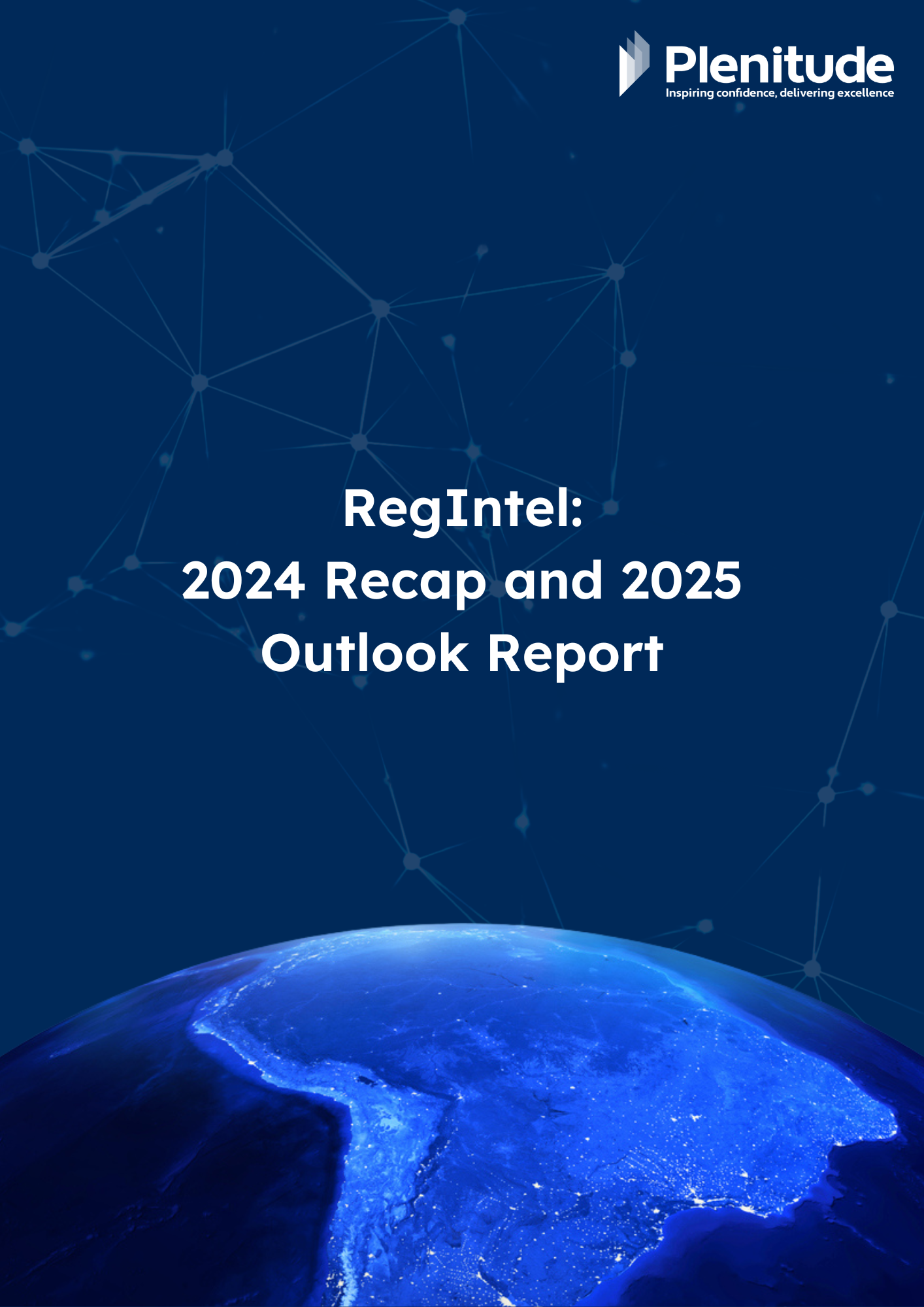In this year’s edition of Plenitude’s RegIntel report, our Regulatory Intelligence team provides an in-depth review of financial crime regulatory developments throughout 2024 and anticipates potential changes on the horizon for 2025. This paper covers critical regulatory advancements across four leading global financial jurisdictions: the United Kingdom, European Union, Hong Kong, and Singapore.
The report explores significant legislative, regulatory, and industry updates across the core anti financial crime areas such as, anti-money laundering (AML), counter-terrorist financing (CTF), counter-proliferation financing (CPF), fraud prevention, sanctions compliance, and enforcement actions from regulators.
This report is designed to assist financial crime compliance (FCC) teams in navigating the ever-evolving regulatory landscape, staying informed of new and amended requirements, and adopting best practices aligned with industry standards.
With the election of the Labour Party in early July, the United Kingdom's regulatory focus transitioned from the Conservative government’s anti-fraud blueprint—addressing payment fraud, corporate criminal liability, and fraud prevention, outlined within their Second Economic Crime Plan 2023–2026—to Labour's redoubled efforts against corruption and money laundering. Despite the change in political hue, both parties have remained resolute in their shared commitment to address fraud, both domestically and internationally, reflecting a consistent cross-party resolve.
The European Union has made notable progress in strengthening its regulatory framework, setting a global benchmark in key areas of governance. With the European AI Act now in force, the EU has set a new global standard for artificial intelligence, striking a delicate balance between fostering innovation and safeguarding societal values. In tandem, France also reinforced its financial crime prevention framework, tightening transparency requirements under the Monetary and Financial Code. Additionally, the EU’s comprehensive anti-money laundering and counter-terrorist financing reforms—embodied in the Sixth Anti-Money Laundering Directive, the ‘Single Rulebook’, and the AMLA Regulation—have fortified the Union’s commitment to tackling financial crime with a unified and robust approach across member states.
In 2024, Hong Kong spearheaded regulatory innovation, exemplified by initiatives such as the AML/CTF Surveillance Capability Enhancement Project (AMLS) and the HKMA's public consultation on information sharing —both of which reflect a decisive commitment to strengthening regulatory frameworks and leveraging RegTech solutions.
Similarly, throughout 2024, Singapore further cemented its position as a global financial hub with the introduction of key legislation, and initiatives aimed at bolstering its anti-money laundering (AML) and financial crime frameworks. Notably, the Anti-Money Laundering and Other Matters Bill expanded regulatory requirements for financial institutions, enhancing due diligence and reporting obligations to better combat money laundering and terrorism financing. In parallel, the Corporate Service Providers Bill introduced stricter regulations for corporate service providers (CSPs) subjecting them to AML/CTF rules and mandating nominee disclosures. Singapore also launched the COSMIC platform (Collaborative Sharing of ML/TF Information & Cases), which facilitated real-time information sharing between financial institutions, regulators, and law enforcement, further enhancing the nation’s collaborative efforts to detect and prevent financial crimes. These developments highlight Singapore's continued commitment to fostering a secure, resilient financial ecosystem, reinforcing its leadership in the global fight against money laundering and terrorism financing.
Both Hong Kong and Singapore placed a premium on cross-sector cooperation and the integration of advanced technologies to address emerging threats, such as cyber fraud and vulnerabilities arising from digital assets. As we look to 2025, the emphasis in Asia’s key financial hubs will undoubtedly pivot towards aligning cutting-edge technological advancements with robust regulatory frameworks, ensuring that firms are not only prepared to meet heightened regulatory scrutiny but also equipped to adapt to the evolving complexities of operational demands.
This report foresees continued regulatory evolution, particularly in relation to emerging technologies and the growing risks of international financial crime. As such, firms must stay vigilant and agile, ensuring their compliance frameworks are adaptable to the shifting global landscape. Providing critical insights into the regulatory developments of 2024, this RegIntel report also offers strategic foresight into the trends and challenges expected to shape 2025. Financial institutions must take proactive measures to adjust to these changes, positioning themselves to navigate an increasingly complex and interconnected financial system.
Throughout 2024, regulatory scrutiny on financial crime prevention has intensified, imposing stricter compliance requirements on firms across key jurisdictions. As we move into 2025, the regulatory landscape will be defined by a heightened commitment to accountability and corporate responsibility, notably through the introduction of the Failure to Prevent Fraud (FTPF) offence in the UK, compelling firms to adopt stronger internal controls. Simultaneously, the full implementation of the Markets in Crypto-Assets (MiCA) Regulation will solidify a comprehensive framework for digital asset oversight across Europe, reinforcing transparency and compliance. As regulatory bodies intensify their focus on emerging technologies like AI, 2025 will usher in an era of greater integration, collaboration, and sophistication in the global fight against financial crime.
Conclusion
The 2024 edition of Plenitude’s RegIntel report underscores the dynamic and increasingly complex nature of financial crime regulation across major global financial jurisdictions. This year’s developments have emphasised the importance of harmonising international standards while responding to emerging threats, from digital asset vulnerabilities to cyber fraud and the transformative potential of AI technologies.
In the United Kingdom, the regulatory landscape underwent a notable shift following the Labour Party’s election in July. While the Second Economic Crime Plan 2023–2026, introduced by the previous Conservative government, laid the groundwork for addressing payment fraud and corporate liability, Labour’s renewed emphasis on tackling money laundering and corruption has reinforced the country’s dedication to robust anti-financial crime measures. Central to this effort in 2025 will be the implementation of the Failure to Prevent Fraud offence, compelling businesses to adopt stricter internal controls to mitigate fraud at its root.
Across the European Union, the establishment of the AMLA marks a transformative step in the fight against financial crime, not only within the EU but on a global scale. As financial crime becomes more complex, AMLA is designed to strengthen the EU’s regulatory framework by serving as a centralised, independent body. Its mission is to ensure consistent and effective AML/CFT measures across Member States. This significant development aligns with broader international progress, including the UK’s focus on fraud prevention under its new government and Asia’s adoption of innovative RegTech solutions in Hong Kong and Singapore. Together, these initiatives underscore a shared global commitment to transparency and integrity in financial systems.
Within the EU, AMLA plays a central role in a comprehensive regulatory overhaul, which includes the 6AMLD and the Single Rulebook. These initiatives aim to unify and enhance compliance standards across the Union. AMLA will collaborate with national regulators, intervene where national authorities fail, and take direct responsibility for supervising high-risk financial entities from 2028. Its establishment is backed by Regulation (EU) 2024/1620, adopted in May 2024, with operations set to begin in July 2025. Frankfurt, selected as AMLA’s headquarters following a competitive bidding process, highlights the EU’s strategic decision to situate the Authority within a financial ecosystem that already hosts the European Central Bank.
In Asia, financial hubs such as Hong Kong and Singapore have also advanced their regulatory agendas. Hong Kong’s public consultation on information sharing and the AMLS project exemplify a forward-thinking approach to harnessing RegTech, while Singapore’s AML and Other Matters Bill and Corporate Service Providers Bill further solidify its position as a global leader in compliance. Both jurisdictions have prioritised cross-sector collaboration and the integration of advanced technologies, recognising the critical importance of these strategies in addressing dynamic and evolving financial threats.
Looking ahead to 2025, the global focus on aligning cutting-edge technologies with comprehensive regulatory frameworks will take centre stage. The European AI Act, now in force, offers a blueprint for striking a balance between fostering innovation and implementing safeguards against misuse—principles that are expected to influence regulatory strategies worldwide. However, at the heart of these advancements within the European Union lies the pivotal role of the AMLA.
As AMLA begins operations in July 2025, it will bring transformative change to the EU’s approach to combating financial crime. By directly supervising high-risk financial entities, AMLA will address gaps in national oversight, ensuring that financial crime is met with robust and effective countermeasures. For financial institutions operating within the EU, AMLA’s establishment represents both an opportunity and a challenge. The Authority’s mandate to enforce stricter compliance measures will require institutions to adopt more sophisticated frameworks that leverage technologies such as RegTech and AI to meet the enhanced regulatory demands. Institutions will need to remain agile, not only to comply with AMLA’s oversight but also to anticipate and address the broader regulatory expectations set by evolving frameworks like the 6AMLD and the Single Rulebook.
Globally, AMLA’s role in 2025 will resonate beyond Europe, influencing international standards and inspiring similar initiatives in other jurisdictions. Its operational debut signals a heightened commitment to transparency, accountability, and collaboration in addressing the interconnected nature of financial crime. By fostering cross-border cooperation and setting a new benchmark for regulatory excellence, AMLA aims to restore and enhance confidence in the integrity of financial systems worldwide.
In conclusion, as financial crime grows more sophisticated and interconnected, so too must the measures to combat it. This RegIntel report provides the critical insights necessary for financial institutions to navigate this evolving landscape, equipping them to meet the demands of 2025 and beyond. Through vigilance, collaboration, and innovation, the financial sector can uphold the principles of transparency, accountability, and integrity in an increasingly complex global market.



 Giles Christou
Giles Christou
 Eleanor Hancock
Eleanor Hancock
 Leeroy Masamba
Leeroy Masamba
 Plenitude Insights
Plenitude Insights Fraud
Fraud RegSight
RegSight



